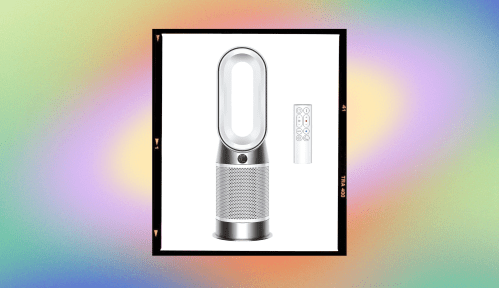Our editors independently select these products. Making a purchase through our links may earn Well+Good a commission
I Tried Taking Magnesium for Better Sleep—Here’s How I Feel After 30 Days
Learn what a writer discovered when she started taking magnesium for sleep and asking sleep experts about its effects.

The quest for better, longer, or more restful sleep is pretty universal. While there are, of course, varying degrees of sleep problems, it seems like just about everyone could use a boost in this department from time to time.
Experts in This Article
Personally, I struggled with waves of insomnia that could last up to a week in my early 20s, something that I’m lucky to say has largely subsided these days. Still, having grown up with a dad who’s dealt with chronic insomnia for much of his adult life that no medication nor sleep study has seemed to quiet entirely, I’m always wary of my overall sleep health going awry.
ThirdLove Just Launched Bras That Help Balance Your Body Temperature—Here’s Why That’s a Game-Changer for Women in All Life Stages

These Are the Only Types of Underwear You Should Be Wearing, According to Gynecologists

These Are the Summer Essentials You Should Bring With You Every Time You Leave the House, According to a Derm and an RD

I take melatonin once in awhile if I’ve had several days of half-ass sleep and can feel myself being anxious about adding another night to the tally. It helps me fall asleep fast and sleep deeply, but it’s not something I want to make a habit of taking. So, having heard the buzz about magnesium for sleep, and how, anecdotally, people reported feeling a gradual sleepiness that didn’t leave them feeling in a fog the next day, I was curious to try it for myself.
How I tested magnesium for sleep
I opted for magnesium threonate from Momentous, which contains Magtein, a patented-form of magnesium that’s combined with vitamin C-derived threonic acid. The label recommends taking three capsules at 48 milligrams each roughly a half hour to an hour before bed. I tend to err on the side of less is more with most medications because you just never know how your body is going to react and also because of the unregulated nature of supplements by the U.S. Food and Drug Administration. (ICYMI, a recent widely reported study found the large majority of melatonin gummies on the market grossly misrepresented the amount of melatonin that’s actually in them.)

Momentous Magnesium Threonate — $42.00
This is all to say, I started the first night taking just one capsule, and progressed to two when I didn’t initially notice much of a difference in my rest. Overall, I slept well, but I can’t say that it was markedly better sleep than typical. During this time, I was also experiencing serious allergy fatigue due to the barrage of pollen every time I stepped a foot outdoors (IYKYK and I’m sorry for us!), so I can’t say whether that also impacted my overall tiredness and ability to sleep.
There was one night over the course of the several weeks of my sleep experiment where I did take the full recommended dosage of three capsules. I saw no major difference then either.
But here’s the thing: Experts say, that’s kind of to be expected. In fact, to get the most out of a sleep supplement like magnesium, you have to look at it as, well, a supplement to what else you’re doing for good sleep hygiene, says W. Chris Winter, MD, sleep specialist, neurologist, author, and host of the podcast Sleep Unplugged with Dr. Chris Winter.
“If someone says, ‘I’m gonna supplement my already pretty decent sleep with some magnesium,’ I think there is validity to that,” says Dr. Winter. Particularly for those who are magnesium deficient, “supplementing does make a difference,” he says. “It’s just not going to be the solution to your really difficult chronic insomnia.”
The science behind magnesium for sleep
Magnesium is a micronutrient found in foods such as avocados, leafy greens, and nuts and seeds, but some people may not reach the recommended daily value of 420 milligrams from diet alone. (P.S. When I found this out, I understood much more why the recommended dosage for the Momentus supplement is 144 mg, and perhaps how I was underdosing myself.)
Magnesium is responsible for a lot of our everyday functions, like regulating muscle and nerve function and blood pressure.
As for its role in sleep, “magnesium L-threonate can increase magnesium levels in the brain, reduce anxiety, and promote relaxation,” says Patrick Dixon, CSCS, director of applied sport science at Momentous. “By promoting relaxation, it allows you to fall asleep faster and set you up for a higher quality of sleep throughout the night.”
What’s more, “magnesium plays a big role in the chemicals that would help to turn down or relax the central nervous system,” says Dr. Winter. “Theoretically, if you’re eating a well-balanced and nutritious diet, you should be getting all the magnesium you need, but, taking a little bit of extra magnesium is a nice way to make sure that’s the case and to enhance the role it plays in relaxation,” he explains.
So, should you try magnesium for sleep?
Before you decide to try magnesium, take stock of your current sleep habits. If you’re already doing other things to optimize your sleep such as exercising regularly, eating a healthy diet, regulating your wake-sleep schedules, keeping your bedroom dark, cool, and limiting blue-light exposure at night, adding a magnesium supplement could just be the icing on your already nicely baked sleep cake, says Dr. Winter.
Conversely, if your bedroom is a mess, you sleep too late on the weekends, aren’t very physically active, or have a nighttime scrolling habit, it might be best to get your sleep hygiene in order before you add magnesium, he says. This will account for other issues keeping you up at night that magnesium alone wouldn’t be able to help.
“When you think about sleep supplements, it boils down to three things: How can you help the body calm down, how can you fall asleep more quickly, and when you do fall asleep, how do you improve the quality of that sleep,” says Dixon. If adding magnesium to your evening routine works for you, there’s no reason not to take it (barring any concerns from your doctor).
As for me, I’m planning to keep up with it for now, since it never hurts to get even one more minute of peaceful shut eye.
Sign up for the Well+Good SHOP Newsletter
Get exclusive deals on wellness, beauty, fitness, and food products that have been hand-picked by our editors.
Got it, you've been added to our email list.







